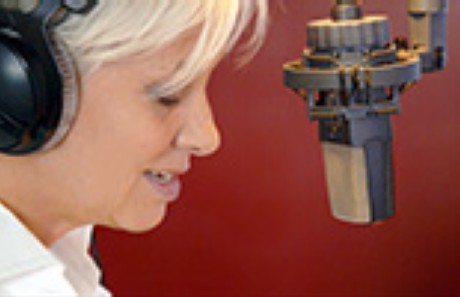


Jakob Brossmann & David Paede: Listen to the Radio

With the Austrian title: «Gehört, Gesehen – Ein RadioFilm“…
5 years after maestro Nicolas Philibert made his „Maison de la Radio », here is another equally fascinating visit to a radio broadcasting channel: Ö1, part of the ORF in Austria, a Kulturradio, praised for its quality and suffering from budget cutbacks like similar radio stations in many countries. Contrary to the French documentary the two directors put the focus on how the staff, led by the boss of Ö1 Peter Klein, looks for solutions to keep the existing loyal listeners and find some new ones in times, where many politicians want to drop the license fee and want to have (indirect) influence on the program profile…
This populist move happens at the same time as the station is about to celebrate its 50th year of existence and works on a new piece of music jingle to introduce itself.
Oh yes, I thought while watching the well made observational documentary… this could be the characterisation of the situation in my Denmark, where DR, the public broadcaster like ORF, faces a budget cut of 20% (unless a new government will change that) and where the P1, the equivalent to Ö1, sometimes in a quite desperate manner, is seeking new ways to perform an independent journalism that is constantly, like the Austrian, accused of being intellectual and leftist.
I make this parallel to say that the film has an international appeal as a cultural institution with a threatened profile in a Europe that goes towards the right and is not interested in public service broadcasting with no commercials.
Ö1 broadcasts and produces a lot of music, which forms a kind of red thread in the documentary. Including the search for the piece that can be used as a new program jingle. And the search for the right voice and tone for „Guten Morgen Österreich“; quite amusing sequences come up to convey the atmosphere in the radio studios, where listening is so important.
How do we get on, is an often asked question at the internal meetings, how do we re-invent ourselves? More collaboration within the staff, more experimentation, what is critical journalism today, is it possible, the camera often stays with the charismatic Peter Klein, the Programmchef, a man whose job (also) is to tell the colleagues that whatever new initiatives are needed and found, budget cuts are coming.
Towards the end of the film, in connection with the election in Austria, you follow the producer of the coverage desperately asking for sound bites with the candidates… difficult it is for a radio channel to get to Kurz and Kern, the political figures at that time. „Television comes first“, she says to a colleague;
of course, but having written that, remember dear reader, if you want reflection and analysis and cultural experiences
– Listen to the Radio.
https://www.filmladen.at/gehoert-gesehen
http://www.filmkommentaren.dk/blog/blogpost/3441/ (link to Brossmann’s previous film, Lampedusa in Winter.
Austria, 2019, 90 mins.